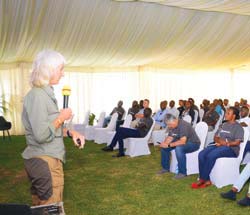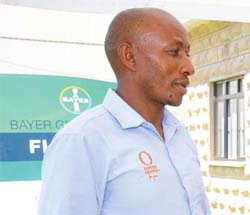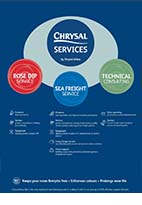Featured Past Articles
By Mary Mwende Mbithi

Nathan A. Cobb, the father of American nematology, in a 1915 quote describes the tremendous ubiquity of nematodes on our planet and says “If all the matter in the universe except the nematodes were swept away, our world would still be dimly recognizable ... we should find its mountains, hills, vales, rivers, lakes, and oceans represented by a film of nematodes. The location of towns would be decipherable, since for every massing of human beings, there would be a corresponding massing of certain nematodes. Trees would still stand in ghostly rows representing our streets and highways.”
Nematodes are found nearly everywhere, both on land and in the sea. The word ‘nematode’ is derived from the Greek, ‘nema’ meaning ‘thread’ and ‘odes’ meaning ‘resembling’.
Read more: ICIPE Joins Bayer East Africa to Discuss Nematodes with Growers
By Mary Mwende Mbithi
 Air freight has for years been the sole mode of transport for flowers in the entire continent. With the international flower business growing substantially recently, sea transport is ‘the new kid in the block’. Coming just in handy as an alternative when the cost of air freight has shot up to $5.8 per kilo of cargo, is more of a milestone to the flower industry.
Air freight has for years been the sole mode of transport for flowers in the entire continent. With the international flower business growing substantially recently, sea transport is ‘the new kid in the block’. Coming just in handy as an alternative when the cost of air freight has shot up to $5.8 per kilo of cargo, is more of a milestone to the flower industry.
Kenya Flower Council’s CEO Clement Tulezi, says that, “sea freight is a solution to gaps left by air freight which amount to about 1500 tonnes per week and the air freight is not expanding. The only way forward is flowers by sea.”
According to Tulezi high freight charges have made produce from neighbouring countries like Ethiopia sell at by 2030. All in all, the use of both air and sea freigh would cut out Kenya as East Africa's Horticultural lodestar.
So far Kenya has created a niche as a mega producer and exporter in horticulture earning the country’s GDP of more than 1% with the horticultural produce ranging from flowers to vegetables and fruits.
Flowers shipped by sea have less stress compared to those shipped by air. However, sea freight is not yet a common practice in the flower business.For instance, a major challenge is the duration it takes for roses from Kenya (about 30-35 days) to reach EU markets. This tells that poor handling and improper treatments may compromise on quality of flowers at their final destination. After arrival in Europe, roses should be able to withstand 3-4 day period in the retail channel and should have a remaining vase life of at least 7 days of acceptable quality. According to Van Doorn, of Chrysal, sea transport of flowers is cheaper than air transport, more flower-friendly and when all steps are adhered to, it gives better quality vase life. To reach the end consumer in a good state, flowers ought to be in right stable conditions and handled carefully.
Flowers set for sea freight are meant to follow a strict cold chain management as well as botrytis control in order to alleviate damages. Early openings, leaf desiccation and fungal infections also need good management. Speaking at the ‘Flowers by Sea’ conference held at Visa Oshwal Center in Nairobi, the Chrysal team talked of a protocol to manage these with pretreatment dip as the initial step before packing the flowers in a sea freight box customized to allow air flow in and out of the box.
According to Dennis Nyamweya of Kuenhe+Nagel, when shipping temperature-controlled goods like flowers, there is the need for reliable logistics that provides seamless cold chain transportation throughout the journey. Flowers via sea could take more than two weeks to their destination, therefore temperature should be maintained so as not to compromise on standards. Kuenhne + Nagel offers transport in reefer containers that are monitored around the clock with temperature controlled interventions in case of deviations in temperatures.
Jeroen van der Hulst, founder and managing director of Flower Watch says, “The implementation of sea freight in Kenya to Europe is a worthwhile development that makes the Kenyan industry more resilient, efficient and sustainable.
 Today, more than ever, the agricultural sector is feeling the pressure of emerging pests and diseases. Intensive international movement of plant material, fruit, vegetables and ornamental plants contribute to this. Moreover, many of the previous known pathogens and insect pests have also become more resilient and resistant to chemical pesticides. A shrinking pool of available chemicals, coupled with few new entrants, means that growers are heavily burdened.
Today, more than ever, the agricultural sector is feeling the pressure of emerging pests and diseases. Intensive international movement of plant material, fruit, vegetables and ornamental plants contribute to this. Moreover, many of the previous known pathogens and insect pests have also become more resilient and resistant to chemical pesticides. A shrinking pool of available chemicals, coupled with few new entrants, means that growers are heavily burdened.
Where we are as Kenyan growers
Kenyan cut-flower growers have in the recent years adopted biological control and integrated pest management (IPM). In spite of this achievement, growers still have to contend with less success in using the same approach to control emerging pests. To date, IPM has focused on insect pests and not on common diseases such as powdery mildew, downy mildew and botrytis. To add insult to injury, more and more bacterial and viral infections are occurring in crops and as a response to this, growers are frequently resorting to disinfectants.
Read more: Harnessing the Power of Nature to Manage Pests and Diseases
Floriculture Magazine was privileged to have an exclusive tete-a-tete with Chrysal’s Commercial Manager East Africa Redbad Verduijn during Chrysal’s Open day this year.

Briefly discuss Chrysal East Africa Ltd?
Redbad: Chrysal Africa is the regional entity and representation for one of the leading post-harvest and flower food providers in the world. Chrysal international is a Dutch based company with a great track record in the flower industry, that is since a couple of years part of the Japanese OAT Agro group.
By Mary Mwende Mbithi
Flower growers preparing their spray program have yet another reason to smile as Bayer East Africa unveiled a superior liquid formulation and a powerful tool designed to protect against fungal diseases on the leaves and in the of soil as well bacterial diseases. This went down at Interplant Roses located at the Flower Business Park in Naivasha, Nakuru County during a Growers Day organized by Bayer. It was an epoch-making fete as growers showed up in huge numbers all geared up for the launch of Serenade® ASO, a biological fungicide that aims at managing the notorious powdery mildew in roses.

Technical Walk
Growers were taken round the greenhouses by Bayer’s team of agronomists where Bayer had contacted their prior trials before concluding on the effectiveness of the product. Different varieties of roses were showcased in various hydroponics system, and it was certain that Serenade® ASO was a game changer.
Roses inflicted with powdery mildew and those already cured from the latter were neatly displayed growing on pumice and coco peat in the hydroponics. It was evident that indeed Serenade® ASO was doing a wonder in rose growing. The roses treated with Serenade® ASO were spick and span, flourishing and looking healthier than those untreated.

He is Passionate about his work because it fills a large part of his life, and the only way to be satisfied is to do what he believes is great work. And the only way to do great work is to love what he does. In my daily work attention to details is key.
How is it coming from your local primary School and rising to where you are? (Personal and Professional background)
I attended Gathiru-ini Primary School in Githunguri, Kiambu County, then proceeded to the neighbouring Gathiru-ini Secondary School. I was destined to attend Gathiru-ini University but since it did not exist, I attended the University of Nairobi in the Capital undertaking a Bsc Agriculture Degree.

By Mary Mwende Mbithi
Two years without you seeing me was the longest time I’ve been away! Did you miss me?” I know you are already wondering, but this is not me, this was actually IFTEX asking after being away for two good years.
It’s been two years since Covid-19 pandemic struck, and that’s just how IFTEX got locked out. Curfews and lockdowns characterized the season, creating turbulence in the flower industry. It was like a long, still and dark night for the flower industry.


